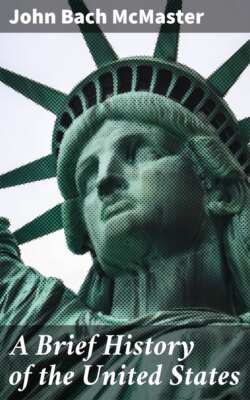Читать книгу A Brief History of the United States - John Bach McMaster - Страница 18
На сайте Литреса книга снята с продажи.
FOOTNOTES
Оглавление[1] The forests supplied the trees for timbers. The seams were calked with the moss that hung in clusters from the branches, and then smeared with pitch from the pines. The Indians made them a rude sort of rope for cordage, and for sails they sewed together bedding and shirts. On the voyage home they ate their shoes and leather jerkins. Read Kirk Munroe's Flamingo Feather.
[2] These men were adventurers, not true colonists, and little disposed to endure the toil, hunger, and dreariness of a life in the wilderness. It was not long, therefore, before the boldest of them seized two little vessels and sailed away to plunder Spaniards in the West Indies. Famine drove them into Havana, where to save their necks they told what was going on in Florida. Sixty-six mutineers presently seized two other vessels and turned buccaneers. But the survivors were forced to return to Fort Caroline, where the leaders were put to death.
[3] Some of these and many others, who were shipwrecked with Ribaut, afterward surrendered and were killed. As Florida was considered Spanish territory the French had no right to settle there, so the French king did nothing more than protest to Spain. Read the story of the French in Florida as told by Parkman, in Pioneers of France in the New World, pp. 28–162.
[4] Read Fiske's Old Virginia and her Neighbours, Vol. I, pp. 19–20.
[5] Read Kingsley's Westward Ho! and Barnes's Drake and his Yeomen. On returning to England in 1573, Drake reached Plymouth on a Sunday, during church time. So great was the excitement that the people left the church during the sermon, in order to get sight of him.
[6] On his return in 1580 Queen Elizabeth knighted Drake on his own deck. A chair made from the timbers of his vessel (the Golden Hind) is now at Oxford. Read Fiske's Old Virginia and her Neighbours, Vol. I, pp. 26–28.
[7] In 1576 Frobisher, when in search of a northwest passage to China, made his way through Arctic ice to the bay which now bears his name. Two more voyages were made to the far north in search of gold.
[8] The ships were overtaken off the Azores by a furious gale. Gilbert's vessel was a very little one, so he was urged to come aboard his larger consort; but he refused to desert his companions, and replied, "Do not fear; heaven is as near by water as by land."
[9] Queen Elizabeth had declared she would recognize no Spanish claim to American territory not founded on discovery and settlement. Raleigh was authorized, therefore, to hold by homage heathen lands, not actually possessed and inhabited by Christian people, which he might discover within the next six years.
[10] The colonists took home some tobacco, which at that time was greatly prized in England. When Columbus reached the island of Cuba in 1492, two of his followers, sent on an errand into the interior, met natives who rolled certain dried leaves into tubes, and, lighting one end with a firebrand, drew the smoke into their bodies and puffed it out. This was the first time that Europeans had seen cigars smoked. The Spaniards carried tobacco to Europe, and its use spread rapidly. There is a story to the effect that a servant entering a room one morning and seeing smoke issuing from Raleigh's mouth, thought he was on fire and dashed water in his face.
[11] On Roanoke Island, August 18, 1587, a girl was born and named Virginia. She was the granddaughter of Governor White and the daughter of Eleanor and Ananias Dare, and the first child of English parents born on the soil of what is now the United States.
[12] The settlers had agreed that if they left Roanoke before White returned, the name of the place to which they went should be cut on a tree, and a cross added if they were in distress. When White returned the blockhouse was in ruins, and cut on a tree was the name of a near-by island. A storm prevented the ship going thither, and despite White's protests he was carried back to England. What became of the colony, no man knows.
[13] Raleigh was an important figure in English history for many years after the failure of his Roanoke colony. When Queen Elizabeth died (1603), he fell into disfavor with her successor, King James I. He was falsely accused of treason and thrown into prison, where he remained during twelve years. There he wrote his History of the World. After a short period of liberty, Raleigh was beheaded. As he stood on the scaffold he asked for the ax, and said, "This is a sharp medicine, but a sound cure for all diseases."
[14] Read Fiske's Old Virginia and her Neighbours, Vol. I, pp. 33–38.
[15] The Elizabeth Islands are close to the south coast of Massachusetts. A few miles farther south Gosnold found another small island which he named Marthas Vineyard. Later explorers by mistake shifted the name Marthas Vineyard to a large island near by, and the little island which Gosnold found is now called No Mans Land (map, p. 59).
